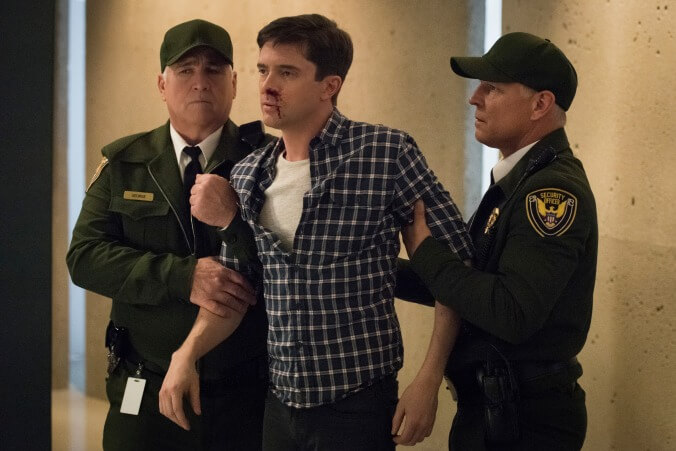Our season two Twilight Zone coverage ends with a barbed take on a familiar premise

A few weeks from now—on July 10th, in fact—Hulu will debut Palm Springs, an Andy Samberg comedy with a Groundhog Day-like premise. Before the world shut down, Palm Springs was going to have a wide theatrical release and then land on Hulu, which in my opinion is where a film so lovable yet so minor was always going to thrive. It’s the kind of movie fans are—appropriately enough—going to watch again and again.
As I write this, most of you—maybe all of you—haven’t seen Palm Springs yet. (I saw it and enjoyed it at the Sundance Film Festival.) But like the movie Happy Death Day in 2017, like the Netflix hit series Russian Doll last year, and like this year’s Twilight Zone episode “Try, Try,” Palm Springs represents a new way of handling a storytelling premise that had previously been just about played-out.
Palm Springs shakes up the Groundhog Day concept by starting the story after the looper’s been repeating the same day for years (and also by adding another looper that the hero has to mentor). Russian Doll is about how life for some people goes in cycles even when they’re not in a loop. Happy Death Day is partly a murder-mystery. As for “Try, Try,” it essentially reimagines Groundhog Day from the perspective of Andie MacDowell’s character—copping to the creepier implications of a man spending his repeating eternity stalking one woman.
The woman’s name is Claudia, played the magnificent Kylie Bunbury. (Bring back Pitch!) On a solo outing to a natural history museum, Claudia nearly steps into traffic, but is pulled to safety by Marc (Topher Grace), a friendly and upbeat guy who’s also headed to the museum, and who pays for her admission before she can protest.
As they walk through the exhibits, Marc impresses Claudia with his sense of humor and his gently philosophical bent. She even likes that his first name ends in “c” and not “k,” because she had a secret crush on a “Marc” when she was a girl. But during their conversation he occasionally says curious things, such as, “How do you still surprise me?” He also does curious things, such as climbing into a canoe on display, because he knows just when the security guard will look away, and for how long.
Eventually, Marc admits what astute viewers will have already figured out: that he’s lived through this impromptu “date” with Claudia many, many times. He’s studied her reactions to his jokes, and has made adjustments accordingly. He knows her tastes, her likes and dislikes, and all the relevant stories from her childhood… like how she’s always wanted to climb into a canoe at a natural history museum. What he doesn’t know—he reluctantly confesses—is how to get her to fall in love with him.
It was a masterstroke to cast Topher Grace in the role of Marc (if that is his real name… he could be faking that to appeal to Claudia). Grace has a boyish charm that slides easily into menace. He’s good at playing characters who are always performing, just a little bit.
Once Marc lets his mask slip with Claudia, he can’t fit it back on. For the rest of their time together, she knows something’s “off.” His playful gestures—grabbing an ancient native American oar off the wall, using it to swat her on the butt—now strike her as insensitive and entitled. His stories about how hard he’s worked to fine-tune the timing of this day become more unsettling than flattering. And she really hates hearing him boast about how he’s actually taken her to bed a few times.
Worst of all: When Marc realizes this day is going to be another loss, he becomes not just cranky but downright dangerous. He admits that he doesn’t really think of Claudia as a real human being, because she resets at the end of each day. And if she’s not “real,” he could do anything to her.
 Keep scrolling for more great stories.
Keep scrolling for more great stories.
